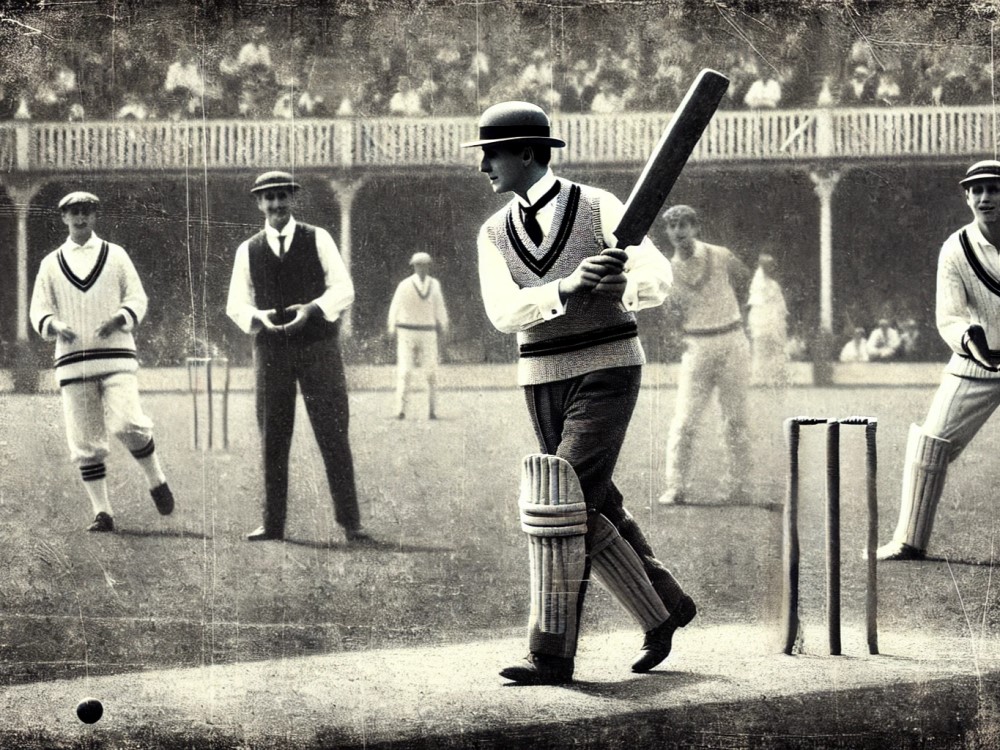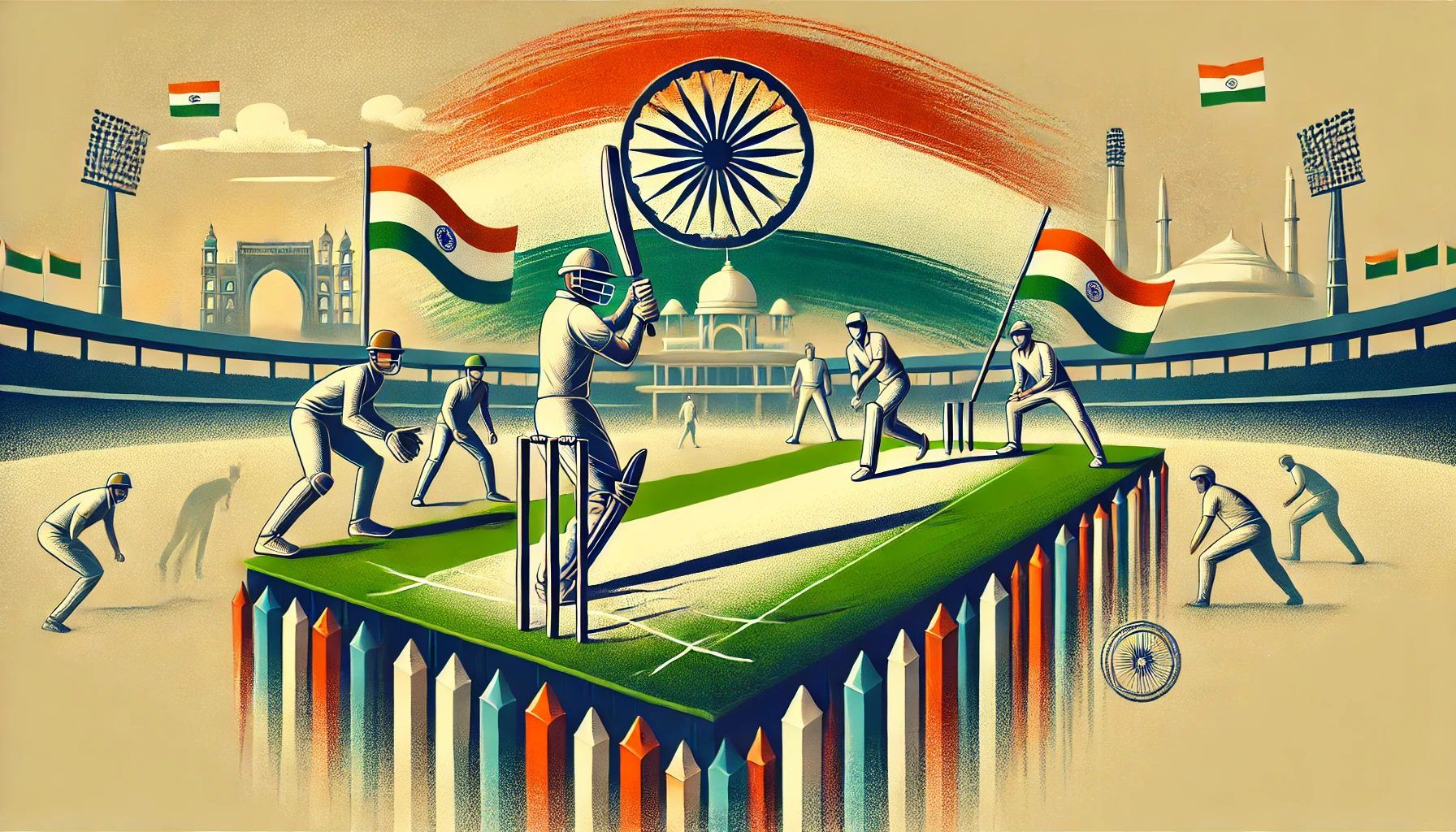
The Role of Cricket in Building National Identity
Cricket has played a crucial role in shaping national identity across several nations, serving as more than just a sport but a symbol of unity, pride, and cultural heritage. The role of cricket in building national identity is evident from its deep roots in history, where it emerged as a pastime in England and gradually spread across the British Empire, becoming a significant part of the cultural fabric of many countries.
The game’s evolution over the centuries, as detailed in the history and evolution of cricket, highlights its transformation from a local sport into a global phenomenon that binds nations together. As cricket spread through the Commonwealth, it became a tool for fostering a sense of belonging and pride among the people, especially in countries where it became a dominant sport.
Strategically, cricket has influenced national identity by showcasing the tactical depth and intellectual rigor required to excel in the game. The importance of cricket strategies and tactics has not only entertained millions but has also provided a platform for nations to express their unique playing styles, further solidifying cricket as a cornerstone of national pride.
Moreover, the role of cricket in building national identity extends to its inclusivity, especially in recent years. The growing influence of women’s cricket has challenged traditional norms and broadened the representation of national identity in the sport, allowing it to reflect the diverse societies in which it is played.
Cricket’s significance in Commonwealth countries is another testament to its power in shaping national identities. The significance of cricket in Commonwealth countries underscores how the sport has become a shared cultural heritage that unites these nations, creating a common identity through competition and camaraderie.
Iconic cricket rivalries, such as the Ashes between England and Australia, have further cemented cricket’s role in national identity, as these matches often transcend the sport itself, becoming symbolic battles that stir deep national pride. The iconic cricket rivalries reflect how cricket can ignite passion and solidarity within a nation.
Additionally, the establishment of various cricket leagues around the world has helped solidify cricket’s position as a central element of national identity. These leagues not only provide entertainment but also offer a platform for the best talents to represent their countries, further enhancing the nationalistic fervor associated with cricket.
Cricket has also been a stage where individual players rise to become national heroes, symbolizing the aspirations of their nations. The greatest cricket players often become icons of national identity, embodying the values and spirit of their respective countries.
Finally, the role of spin bowlers in cricket demonstrates how specific aspects of the game can influence national styles of play, further deepening the connection between cricket and national identity.
Cricket as a Unifying Force in Diverse Nations

Cricket has long been more than just a sport; it is a powerful unifying force that brings together people from different walks of life, creating a shared sense of identity and belonging. In many countries, cricket is not just a pastime but a cultural phenomenon that transcends social, economic, and ethnic divides. The game’s ability to unite diverse populations under a common banner has made it a key element in building national identity, particularly in nations where diversity is a defining characteristic.
One of the most striking examples of cricket’s unifying power can be seen in India, a country known for its vast cultural and linguistic diversity. India is home to multiple religions, languages, and ethnic groups, each with its own unique traditions and customs. Despite these differences, cricket serves as a common thread that binds the nation together. When the Indian cricket team takes to the field, millions of fans across the country, regardless of their backgrounds, come together to support their team. The passion and enthusiasm for cricket in India are unparalleled, and the sport has become a symbol of national pride and unity.
Cricket has also played a significant role in uniting the people of the West Indies, a region made up of multiple Caribbean islands, each with its own distinct identity. The West Indies cricket team, which represents a collective of Caribbean nations, has been a powerful symbol of regional unity since its formation. The team’s successes on the international stage, particularly during the 1970s and 1980s, when they dominated world cricket, fostered a sense of pride and solidarity among the people of the Caribbean. The West Indies team became a source of inspiration and a unifying force that transcended the individual identities of the islands.
In South Africa, cricket has been instrumental in bridging the racial and social divides that were entrenched during the apartheid era. The sport played a pivotal role in the country’s transition to democracy, particularly during the 1990s when South Africa was readmitted to international cricket after years of isolation. The 1992 Cricket World Cup marked South Africa’s return to the international stage, and the team’s participation was a significant step toward national reconciliation. Cricket became a symbol of the new South Africa, a nation striving for unity and equality. The sport continues to play an important role in promoting social cohesion and fostering a sense of shared national identity.
In Sri Lanka, cricket has been a unifying force in a nation that has experienced significant ethnic conflict. The sport’s ability to bring people together was most evident during the 1996 Cricket World Cup, when the Sri Lankan team, representing a country that had been torn apart by civil war, achieved an historic victory. The triumph brought the entire nation together in celebration, providing a sense of hope and pride during a difficult time. Cricket has since remained a powerful symbol of national unity in Sri Lanka, helping to bridge divides and promote a collective sense of identity.
Cricket’s role as a unifying force in diverse nations is a testament to its power to bring people together and foster a shared sense of identity. Whether in India, the West Indies, South Africa, or Sri Lanka, cricket has transcended cultural, ethnic, and social divides to become a symbol of national pride and unity. The sport’s ability to unite people from different backgrounds under a common banner makes it a key element in building and reinforcing national identity.
Cricket and National Pride: Symbolizing Success on the Global Stage
Cricket serves as a powerful symbol of national pride, particularly when a country’s team achieves success on the global stage. For many nations, cricket is not just a sport but a representation of the nation’s strength, resilience, and aspirations. The success of a national cricket team can boost morale, foster a sense of collective pride, and enhance the country’s standing in the international community. This connection between cricket and national pride is especially strong in countries where the sport holds a central place in the cultural landscape.
In Australia, cricket is deeply embedded in the national psyche, and the Australian cricket team’s successes are a source of immense pride for the country. The team’s dominance in the sport, particularly during the late 1990s and early 2000s, when they won multiple World Cups and maintained an almost unbeatable record in Test cricket, has solidified Australia’s reputation as a cricketing powerhouse. These achievements have not only brought joy to Australian fans but have also reinforced the nation’s identity as a competitive and resilient country on the global stage. The Australian cricket team’s success has become synonymous with the country’s broader success, and their victories are celebrated as national triumphs.
India’s rise as a cricketing superpower has also played a significant role in shaping the nation’s identity. Historically, cricket in India was introduced by the British during the colonial period, but over time, the sport has been embraced and transformed into a symbol of India’s independence and national pride. India’s victory in the 1983 Cricket World Cup, under the leadership of Kapil Dev, was a watershed moment in the country’s cricketing history. The triumph not only marked India’s arrival on the global cricket stage but also ignited a sense of pride and optimism in a nation still grappling with the challenges of post-colonial development. Since then, cricket has continued to be a vehicle for expressing national pride, with the Indian Premier League (IPL) further enhancing the country’s global reputation in the sport.
In England, cricket holds a special place as the sport’s birthplace, and success in cricket is closely tied to national identity. The historic 2019 Cricket World Cup victory, where England won the tournament in a dramatic final against New Zealand, was a moment of immense pride for the nation. The victory was celebrated as a culmination of years of dedication and hard work, and it reinforced England’s status as a leading cricketing nation. The win also sparked a renewed interest in the sport across the country, with cricket once again becoming a focal point of national pride and identity.
For Pakistan, cricket has been a source of unity and pride, particularly during challenging times. The country’s victory in the 1992 Cricket World Cup, under the captaincy of Imran Khan, is one of the most iconic moments in Pakistan’s cricket history. The win brought the nation together in celebration, providing a sense of hope and pride amidst political and economic difficulties. Cricket continues to be a unifying force in Pakistan, with the national team’s performances on the international stage often seen as a reflection of the country’s resilience and determination.
Cricket’s role in symbolizing national pride is evident in the way the sport is celebrated across different countries. Whether in Australia, India, England, or Pakistan, cricket serves as a representation of national success, resilience, and identity. The achievements of national cricket teams on the global stage not only bring joy to fans but also reinforce a collective sense of pride and belonging, making cricket a vital part of the national identity in these countries.
The Role of Cricket in Post-Colonial National Identity

In many countries, cricket has played a crucial role in shaping national identity in the post-colonial era. For nations that were once part of the British Empire, cricket, a sport introduced by the colonizers, has been transformed into a symbol of independence and self-expression. The way these countries have embraced and redefined cricket reflects their journey towards establishing a distinct national identity, separate from their colonial past.
One of the most significant examples of cricket’s role in post-colonial national identity is seen in India. Cricket was introduced to India by the British during the colonial period, and it was initially played by the British elite and the Indian aristocracy. However, over time, cricket became a sport for the masses, and it was adopted by Indians as a way to assert their identity and resist colonial dominance. The 1983 Cricket World Cup victory was a defining moment in this process, as it marked India’s emergence as a cricketing power and a nation capable of competing with and defeating its former colonizers on the global stage. The victory was not just a sporting achievement; it was a statement of India’s newfound confidence and independence.
Pakistan’s relationship with cricket in the post-colonial era is also deeply intertwined with its national identity. After gaining independence from British rule in 1947, Pakistan quickly embraced cricket as a national sport. The country’s cricketing success, particularly its 1992 World Cup victory, has been a source of immense pride and has helped to forge a strong sense of national identity. Cricket has provided Pakistan with a platform to showcase its talent and resilience, and it has become a symbol of the country’s ability to overcome challenges and achieve greatness on the international stage.
In the West Indies, cricket has played a pivotal role in the region’s struggle for independence and self-determination. The West Indies cricket team, representing a collection of Caribbean nations, became a powerful symbol of unity and resistance against colonial rule. The team’s dominance in international cricket during the 1970s and 1980s, particularly under the leadership of Clive Lloyd and Viv Richards, was seen as a triumph for the entire Caribbean. Cricket provided the people of the West Indies with a sense of pride and identity that transcended national boundaries, and it played a key role in the region’s journey towards independence.
In South Africa, cricket has been a vehicle for transformation in the post-apartheid era. During apartheid, cricket was a sport largely associated with the white minority, while black South Africans were excluded from the national team. However, with the end of apartheid and the rise of a democratic South Africa, cricket has become a symbol of national unity and reconciliation. The inclusion of black players in the national team, such as Makhaya Ntini and Kagiso Rabada, has helped to transform cricket into a truly representative sport that reflects the diversity of the nation. The sport has played a key role in fostering a new sense of national identity, one that is inclusive and embraces the country’s multicultural heritage.
Cricket has played a significant role in shaping national identity in the post-colonial era. For countries like India, Pakistan, the West Indies, and South Africa, cricket has been a powerful tool for asserting independence, fostering unity, and building a distinct national identity. The sport’s ability to transcend its colonial origins and become a symbol of national pride and self-expression highlights the enduring impact of cricket on the national identity of these countries.
Cricket as a Tool for Social Integration and Unity
Cricket’s role in building national identity extends beyond its influence on cultural and political spheres; it also serves as a powerful tool for social integration and unity. In many countries, cricket has helped to bridge social, ethnic, and economic divides, bringing together people from different backgrounds and fostering a sense of belonging and cohesion. The sport’s ability to unite diverse communities under a common passion has made it an essential element in the process of nation-building and social integration.
In South Africa, cricket has played a crucial role in promoting social integration in the post-apartheid era. During apartheid, the sport was largely divided along racial lines, with separate teams and leagues for different racial groups. However, with the end of apartheid and the establishment of a democratic South Africa, cricket has become a symbol of the country’s efforts to overcome its divided past and build a more inclusive society. The national cricket team, which now represents all South Africans regardless of race, has been a powerful symbol of unity and reconciliation. The success of black cricketers like Makhaya Ntini and Kagiso Rabada has inspired a new generation of South Africans and helped to break down racial barriers within the sport.
In Sri Lanka, cricket has been a unifying force in a nation that has experienced significant ethnic conflict. The country’s long-running civil war between the Sinhalese majority and the Tamil minority created deep divisions within the society. However, cricket has provided a platform for bringing people together, transcending ethnic and religious differences. The Sri Lankan cricket team, which includes players from both Sinhalese and Tamil backgrounds, has become a symbol of national unity. The team’s success on the international stage, particularly their victory in the 1996 Cricket World Cup, brought the entire nation together in celebration and fostered a sense of pride and solidarity among the people of Sri Lanka.
In India, cricket has played a significant role in promoting social integration across the country’s diverse population. India is home to a wide range of ethnic, linguistic, and religious communities, each with its own unique identity. Cricket, however, has become a common passion that unites people from different backgrounds. The Indian Premier League (IPL), in particular, has played a key role in bringing people together, as fans from across the country come together to support their favorite teams and players. The IPL’s emphasis on inclusivity and diversity, with players from different regions and countries coming together to form teams, has further reinforced cricket’s role as a tool for social integration in India.
In England, cricket has also been used as a tool for social integration, particularly among immigrant communities. The sport has provided a way for people from diverse backgrounds to connect with each other and with the broader society. For example, the rise of players like Moeen Ali and Adil Rashid, who are of Pakistani descent, has helped to bridge cultural divides and promote a sense of inclusivity within the sport. Their success on the international stage has inspired young cricketers from immigrant communities and reinforced the idea that cricket is a sport for everyone, regardless of background or ethnicity.
Cricket’s role in promoting social integration and unity is a testament to its power as a unifying force. Whether in South Africa, Sri Lanka, India, or England, cricket has helped to bridge social, ethnic, and economic divides, fostering a sense of belonging and cohesion among diverse communities. The sport’s ability to bring people together and promote social integration makes it an essential element in building national identity and fostering unity.
Conclusion: Cricket’s Enduring Role in Shaping National Identity

Cricket’s role in building national identity is deeply embedded in the history and culture of many nations. From its ability to unite diverse populations and symbolize national pride to its influence on post-colonial identity and social integration, cricket has proven to be more than just a sport; it is a powerful force for nation-building. The sport’s unique capacity to bring people together, transcend cultural and social divides, and foster a sense of collective identity makes it an essential element in the formation and reinforcement of national identity.
In countries like India, the West Indies, South Africa, and Sri Lanka, cricket has played a pivotal role in shaping national identity, serving as a symbol of independence, pride, and unity. The success of national cricket teams on the global stage has not only brought joy to millions of fans but has also reinforced a sense of belonging and pride in the nation. Cricket’s ability to inspire and uplift, even in times of adversity, highlights its enduring significance in the lives of people around the world.
As cricket continues to evolve and grow in popularity, its role in building national identity will remain as important as ever. The sport’s emphasis on fair play, sportsmanship, and inclusivity ensures that it will continue to be a unifying force, bringing people together and fostering a sense of pride and identity in nations across the globe. Whether through international competitions, domestic leagues, or grassroots initiatives, cricket will continue to play a vital role in shaping the national identity of the countries where it is loved and celebrated.
Cricket’s role in building national identity is a powerful testament to the sport’s enduring impact on the world. By uniting people from diverse backgrounds, symbolizing national pride, and promoting social integration, cricket has become an integral part of the national identity of many countries. As the sport continues to thrive, its influence on national identity will only grow stronger, ensuring that cricket remains a key element in the cultural fabric of nations for generations to come.





